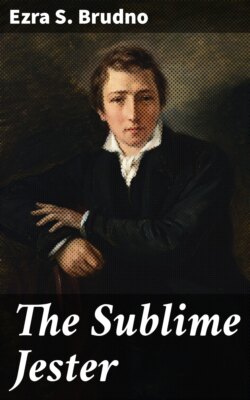Читать книгу The Sublime Jester - Ezra S. Brudno - Страница 20
На сайте Литреса книга снята с продажи.
III.
ОглавлениеTable of Contents
In youth experiences produce impressions, at a maturer age they generate thought. Albert’s mind had the peculiarity of both, youth and maturity. Impressions and thoughts came to him almost simultaneously.
The humiliation of his present surroundings made him shrink with a sensitiveness he could not define. He had thought the Ghetto belonged to the dark ages. He did not yet realize that there was but a step between the Dark Ages and any Age. The bitterness of his soul crowded out every other thought, every other feeling. The jubilee he had witnessed was to him the rejoicing of the sporting Philistines around the chained Samson.
On his return to the tavern he threw himself upon his bed, his hands clasped under his head, his face toward the ceiling, tortured by a thousand conflicting thoughts. The back of his head was burning, and there was a pain in his eyes, the harbinger of one of his nervous headaches.
He tossed and turned. He felt as if the ceiling were coming down on him, as if the walls were pressing together, the very air seemed suffocating. Incoherently the morning scenes flitted through his mind—white robed priests—white—the symbol of truth and purity—the crucifix moulded of silver against a black background—another symbol—the images of saints, their eyes turned heavenward—Ah, that was too much for the impulsive, poetic youth, who never had to search for the truth, to whom truth came flying. He was writhing with pain, the mortifying pain of helplessness. No, he was not helpless, he was saying to himself. Socrates was not helpless; Spinoza was not helpless; Lessing was not helpless. Every one must carry his torch as well as his cross. Yes, he would make his torch flare so that it would dispel the darkness around him. A strange ambition seized him. He did not want to be a poet. He did not want to be a money changer. He wanted to be a warrior to help mankind free itself from its own enslavement. Nor did he crave earthly pleasures. For the moment he was an old man satiated with the pleasures and pains of life. Then came over him the sweeping melancholy of blossoming youth. The heavens opened before him and he caught a glimpse of eternity. Yes, he might fight—live and fight for the truth.
How strong the sun was shining in his eyes! Its rays were coming through a window opposite his bed. He turned his face to the wall, away from the light. Patches of pink and yellow and purple floated before his eyes in the shape of lotus flowers, and around them large golden wheels revolved, emitting diamond sparks, with the sound of a waterfall in his ears ... No, it was not the sound of rushing water. It was a musical sound ...
He soon recognized the tune. It was Allegri’s Miserere ... and the light of an oblique column of sun dust was in his eyes .. He turned and noticed the strong sunlight falling upon the wooden image of the Christ—the wooden image that stood under those arches in the Franciscan cloister. It was the same figure, the same bleeding Christ with a broad gash between the ribs, the same smear of blood. The figure was nodding its head—it was beckoning to him—but he could not budge. The figure then began to move toward him, and the palms, instead of nailed to the cross, were unfastened and turned heavenward, and the head, instead of drooping, was thrown back, with derisive laughter on the sorrowful face—Yes, the figure was laughing, a strange, mocking laugh that made him shudder, and the laughter blended weirdly with the dying notes of the Miserere—
“Are you asleep, Albert?”
His father’s voice seemed to come from a great distance.
“No, I haven’t slept—I am just resting—” Albert mumbled and rose to a sitting posture.
“Herr Rindskopf assured me there is a great opportunity for you in his bank,” Zorn was saying cheerfully. “And he is a fine man to work for, Rindskopf is.”
Albert listened to his father as if in a dream, as if only remotely interested in the subject.
